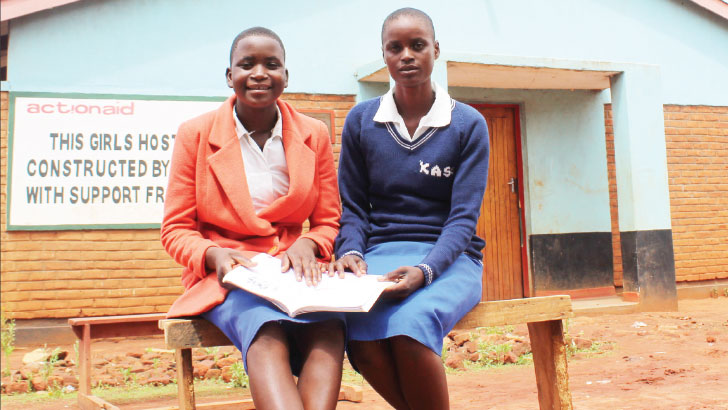Girls out of sex den
A hostel has saved girls from a sex den, writes our Staff Writer JAMES CHAVULA.
Lihan Nquiliwa prefers nursing to music, but knows nearly all party hits that made Malawi’s nightlife culture tick when she was studying for Junior Certificate of Education in 2019.
From club hits to love tunes, the 16-year-old Form Four learner at Kanjuchi Community Day Secondary School in Mzimba sings them all with ease.
Lihan and her schoolmates passively crammed the music when they rented rooms in a sex haven while fleeing long walks to school.

She explains: “It takes an hour to walk from home in Chitete Village to school. To live closer to school, my friends and I occupied rooms next to noisy sex workers. They used to flash cash and downplay education to lure us into their risky trade.”
Lihan rues the noisy neighbours for making it difficult for the schoolgirls to study.
“If it weren’t loud music or sing-alongs, they were dragging their clients to bed or quarrelling over money and liquor. From their screams, we could hear everything they were doing and how much they were demanding,” she recounts.
Lihan and her classmate Alinafe Chisale, 18, remember the sex workers urging them to stop schooling and start entertaining men who could provide basics they were struggling to get.
Just like that, the unregulated self-boarding facility left the girls from distant villages on the brink of transactional sex that left their peers pregnant and married too early.
“We used to live and chat with the sex workers day and night. They were our housemates and role models.
Even their clients were troubling us, winking and flaunting cash to trap us into the sex web which was more vibrant during the tobacco-selling season,” says Alinafe, from Yafeti Chipeta Village, a four-hour walk from her school.
Motorcyclists charge K2 000 for the trip while bicyclists demand K1 000.
Some girls resisted the aroma of money circulating in the tobacco-growing area.
However, Lihan and Alinafe remember their schoolmates skipping classes and studies to sell their bodies, drink and smoke at Kanjuchi Trading Centre.
“Most of them were dumped after being impregnated by men because it wasn’t love, but give-and-take,” says Lihan.
Not any longer. These lamentations have become fading history for the girls in the rural area, where secondary schools are far apart.
They now occupy a new hostel constructed by Tideco Community-Based Organisation with support from ActionAid Malawi to ensure every child learns.
Head teacher Lameck Gondwe says the performance and retention of girls is improving as they no longer worry about long walks, sleepless nights, sexual harassment and risky sexual flings rampant in self-boarding settings.
“The hostel has given the girls a safe space close to their classrooms. They no longer struggle to study as was the case in the tiny rooms which used to take 10 people instead of one or two. They have more room, beds, safe water, electricity and toilets,” he says.
The hostel with solar-power gives the girls the ease to study beyond sunset without distressing about noise or fumes of tobacco, kerosene lamps and candles.
“With this, girls are no longer at risk of skipping studies or quitting school due to sexual temptations as was the case in dilapidated self-boarding structures where no one was looking after them.
“This will help reduce early marriages and pregnancies which cost futures of many girls in this area,” says youth activist Vincent Banda.
He leads a youth group which has given teen boys and girls a safe space to discuss shared concerns and brainstorm solutions.
Banda urges the government to ensure every secondary school has girls’ hostels to reduce dropout rates fuelled by early pregnancies and marriages.
According to the Malawi Demographic and Health Survey of 2015, nearly half of Malawian girls marry before their 18th birthday and a third become mothers during their adolescence.
Some 10 girls at Kanjuchi quit school due to the twin problem last academic year compared to just one boy.
“Thanks to the hostel, we keep track of the girls, what they are doing and who they are meeting,” says head teacher.
The National Education Policy requires no learner to walk over five kilometres to get to class.
Minister of Education Agnes NyaLonje says the government will continue to work closely with its partners to ensure schools have facilities girls need to excel and achieve their dreams.






One Comment